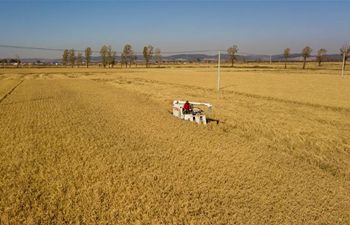BERLIN, Oct. 16 (Xinhua) -- The German government presented on Wednesday the first drafts of laws on various carbon saving measures as required by the national Climate Action Plan.
According to the Ministry of Finance, the value-added tax on long-distance train tickets should be reduced from 19 percent to 7 percent, making this type of travel in Germany around 10 percent cheaper in order to promote a switch from cars to trains.
Richard Lutz, chief executive officer (CEO) of Germany's government-owned rail company Deutsche Bahn, has already promised that the reduction would be entirely passed on to passengers.
In order to apply carbon footprint considerations to inland as well as international flights and to reduce "false incentive effects," the ministry also announced its intention to increase taxes on flight tickets.
The air traffic tax on flights in Germany as well the European Union would be increased by around 76 percent, while taxes on international flights would increase by 43 percent.
Scheduled for April 2020, the new tax rate for domestic flights is set to increase to 13.03 euros (14.37 U.S. dollars). The tax for medium-haul flights (between 2,500 and 6,000 kilometers) would increase to 33.01 euros, while the tax for long-distance flights (over 6,000 kilometers) would be 59.43 euros.
"The additional revenues from the air traffic tax contribute to making it possible to reduce the value-added tax on long-distance rail traffic," the ministry explained on Wednesday.
As a further measure, the German government decided on key elements of its planned CO2 pricing scheme. Aiming to incentivize the development and purchase of climate-friendly cars and heating systems, the use of climate-damaging fuels (oil, natural gas, coal) would be subject to a carbon price.
Starting in 2021, an entry price of ten euros per ton of CO2 emitted would be added to fuels used for heating and transport. The carbon price would initially only apply to emissions from the transport and building sectors and is planned to rise to 35 euros by 2025.
After 2025, Germany would introduce a national emissions trading scheme for these sectors with an initial price range of between 35 euros and 60 euros.
To compensate Germans for higher fuel prices as a result of the upcoming CO2 price in transport, the commuter allowance for those traveling more than 21 kilometers would be increased from 30 eurocents to 35 eurocents per kilometer.
As an additional carbon-saving measure, the owners of condominiums or houses older than ten years should receive annual tax incentives of up to 40,000 euros for three years if they insulate walls or roofs, renew windows, doors or the heating system.
The German government is seeking to pass the draft laws by the end of this year by shortening the voting process in the lower and upper houses of parliament (Bundestag and Bundesrat, respectively). (1 euro = 1.10 U.S. dollars)













